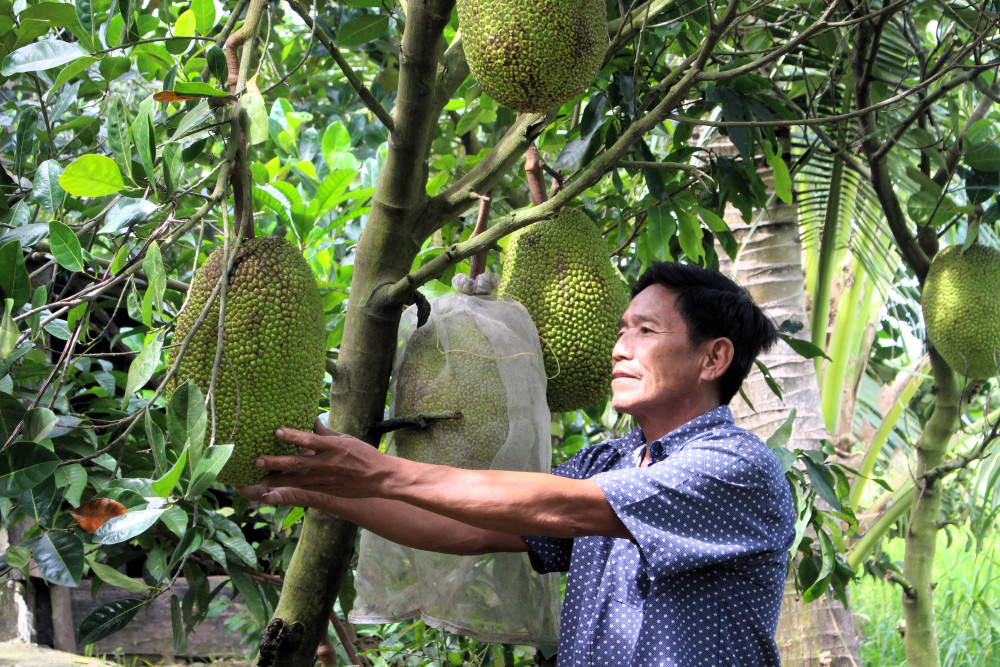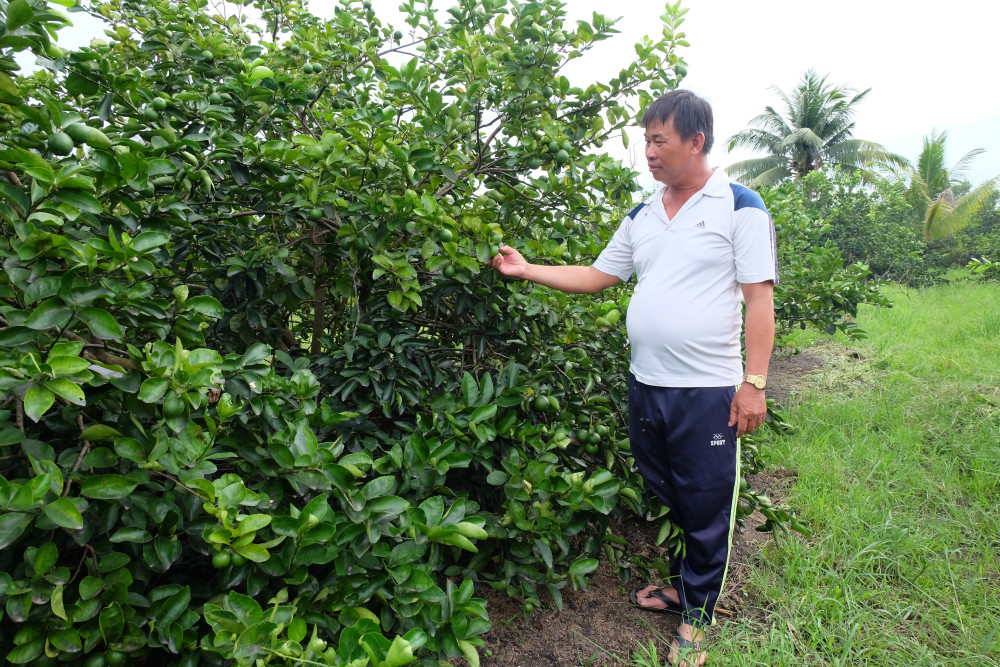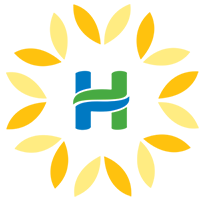Agricultures, Foods, News & Event
Increase the value of agricultural products to expand the agricultural market
Long An’s agricultural products are rich and of increasingly high quality, and have great opportunities to expand export markets. However, to conquer demanding markets and increase the value of agricultural products, there needs to be synchronous solutions from improving quality, innovating processing technology to building brands. This will not only help improve farmers’ lives but also contribute to the overall economic development of the province.
Improving crop quality
In the context that many farmers are looking for new directions to improve agricultural production efficiency, Mr. Tran Dang Khoa (Truong Cong Y hamlet, Tan Lap commune, Tan Thanh district) has become a typical example with a large-scale durian growing model. From converting each part of the initial cultivated land area, Mr. Khoa now owns 6 hectares of durian garden, of which 3 hectares are at fruit-bearing age.
Thanks to thorough investment, the use of high-quality varieties and support from the Farmers’ Association at all levels and the agricultural sector, his model not only brings high profits but also affirms the great potential of durian in increasing the value of local agricultural products.

Mr. Khoa shared: “I planted durian 7 years ago after realizing that previous crops such as rice or dragon fruit did not bring the expected economic efficiency. Initially, I only converted about 2 hectares, gradually expanded and now have 6 hectares of durian, of which 3 hectares are bearing fruit. With a large investment cost, about 6-8 million VND per tree from planting to harvesting in 5 years, growing durian is a big challenge. However, the profit is also very high, on average, each crop, 1 hectare of durian earns about 800 million VND”.
Currently, Tan Lap commune is granted 3 durian growing area codes, of which Mr. Khoa is the representative of 1 code, but because it has not produced fruit simultaneously, it has not produced enough output to sign an export contract. Currently, Mr. Khoa is improving his knowledge to improve the quality of durian to meet export standards to China as well as to target other demanding markets; At the same time, apply more technology to production to increase productivity and ensure product quality. From there, build a local durian brand that reaches far, stabilizes output, increases income and develops the economy sustainably.
Converting crop structure towards sustainability is becoming an inevitable trend in many localities, especially with fruit trees of high economic value such as jackfruit.
Mr. Nguyen Van Deo (Bang Lang Hamlet, Tan Lap Commune, Tan Thanh District) has successfully applied VietGAP standards to grow 1 hectare of jackfruit. It is known that he is currently the Head of the Bang Lang Hamlet Farmers’ Association and the Head of Group 2 of the VietGAP jackfruit growing model in the locality.
With stable productivity, guaranteed quality and meeting market requirements, his jackfruit garden not only brings high income but also contributes to enhancing the reputation of local agricultural products.
Mr. Deo shared: “Local farmers are completing the application to apply for additional growing area codes, with a “passport” for officially exported jackfruit products. In the immediate future, the market we want to approach is China, because this has always been a large market for Vietnamese agricultural products. After that, farmers will try to improve the quality of agricultural products and build brands to conquer more demanding markets such as Japan, Europe and the United States. Being granted a growing area code not only helps increase the value of jackfruit but also opens up great opportunities for local farmers to develop a sustainable economy.” Deputy Director of the Department of Agriculture and Rural Development – Ho Thi Ngoc Lan said that increasing the value of agricultural products is one of the important goals of the provincial agricultural sector. Not only focusing on output but also paying attention to the quality and added value of agricultural products. Applying science and technology in production is a key factor to increase competitiveness in the international market. In the coming time, the agricultural sector will continue to support localities to improve product quality; create stable and sustainable distribution channels so that the province’s agricultural products can reach further.
Promoting brand building
According to the Department of Industry and Trade, in 2024, the export turnover is expected to reach 7.5 billion USD, reaching 100% of the plan and increasing by 8.69%. Of which, agricultural exports in the first 10 months of 2024 for rice reached 350.3 million USD and other agricultural products reached 593.5 million USD. It is expected that in the whole year of 2024, agricultural exports will reach 1.2 billion USD. Thereby affirming that the province is a large market for domestic and foreign enterprises.
In 2024, the Department of Cultivation, Plant Protection and Agricultural Product Quality Management of the province supported 8 cooperatives to produce rice, grapefruit, and jackfruit according to VietGAP standards with an area of 282.5 hectares certified, with an output of 4,887.25 tons of products/year. To date, the whole province has 2,902.1 hectares certified by VietGAP; There are 300 growing area codes with a total area of 14,570 hectares exported to markets: Korea, Japan, the United States, Australia, New Zealand, Europe, Russia, China, … and 170 export fruit packaging facility codes in operation.
Long An is currently the leading province in the Mekong Delta in terms of lemon growing area with more than 11,888 hectares. Of which, Ben Luc district accounts for more than half of this area, mainly 2 main varieties of seedless lemon and purple flower lemon.
In recent times, local authorities have actively organized training courses, technical guidance and science and technology transfer, helping farmers improve production efficiency. Thanks to that, many households have stable income and higher economic conditions.
Ben Luc seedless lemons stand out with firm fruit, thick segments, dark green, shiny, even-colored skin, and a surface containing many essential oil sacs. Thanh Hoa Agricultural Service Cooperative (Ben Luc district) was established in 2014, currently has 15 members growing 30 hectares of seedless lemons.
Chairman of the Board of Directors and General Director of Thanh Hoa Agricultural Service Cooperative – Dang Van Phai said: “When lemon trees were discovered to be suitable for the soil, people began to switch to this type of tree. Thanks to stable output and good prices, people’s lives have improved. Lemon growing areas that meet GlobalGAP standards are exported to Europe, the remaining quantity serves the domestic market and other markets”.
Previously, Mr. Nguyen Van Tuoi (Hamlet 6, Binh Duc Commune, Ben Luc District) was attached to sugarcane but the selling price was unstable and the consumption market was unstable. After visiting and learning about crop conversion models in localities, in 2012, he boldly experimented with planting seedless lemons on a part of the sugarcane growing area. Seeing that lemon trees were suitable for soil conditions and brought high profits, in 2016, he decided to convert the entire land area to growing seedless lemons. Currently, he cultivates more than 3 hectares with 1,500 lemon trees, of which 1ha is bearing fruit, and 2ha are newly planted.
According to Mr. Tuoi, the seedless lemon tree gave its first harvest after just over 1.5 years of planting. If organic fertilizer is used, the tree’s lifespan can last from 6-8 years. In particular, this lemon variety can be harvested year-round and begins to yield high yields from the second year. His family usually harvests every 15 days. Thanks to cooperation with the Dutch Lemon Export Company (headquartered in Can Tho City), lemons are purchased at a stable price, about 5,000 VND/kg higher than the market price.

“I have sold lemons to the company for more than 11 years. To maintain the cooperation, I use fertilizers and pesticides according to the company’s regulations and adhere to strict cultivation processes, especially not using herbicides because the products exported to the Netherlands require very high quality. Although it is a bit cumbersome, in return, the lemons have a stable output and contribute to bringing the Ben Luc seedless lemon brand to the international market. That is also a way to build prestige and brand for local agricultural products” – Mr. Tuoi shared.
Increasing the value of agricultural products is not only the “key” to expanding the export market but also the driving force to promote the sustainable development of the province’s agriculture, contributing to bringing Vietnamese agricultural products to the far, conquering demanding markets and bringing high economic value./.
Source: https://baolongan.vn/nang-cao-gia-tri-nong-san-de-mo-rong-thi-truong-nong-san-a186844.html

